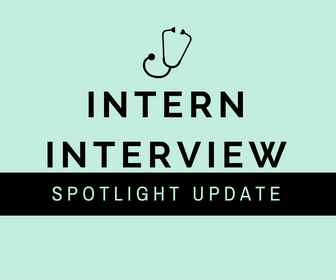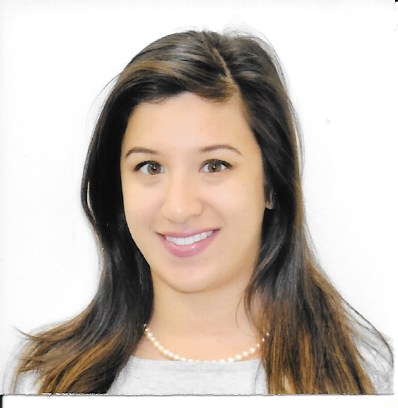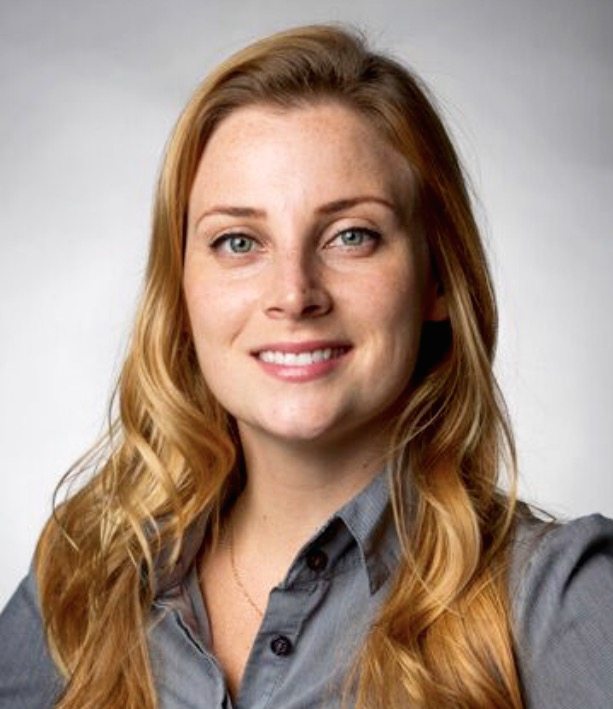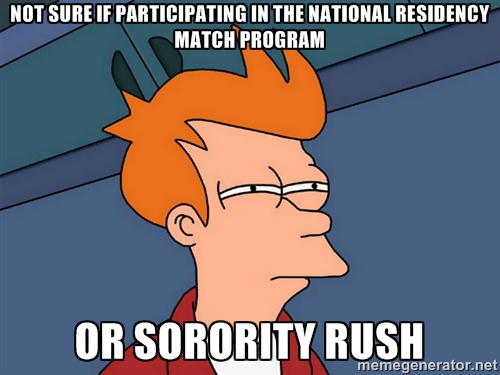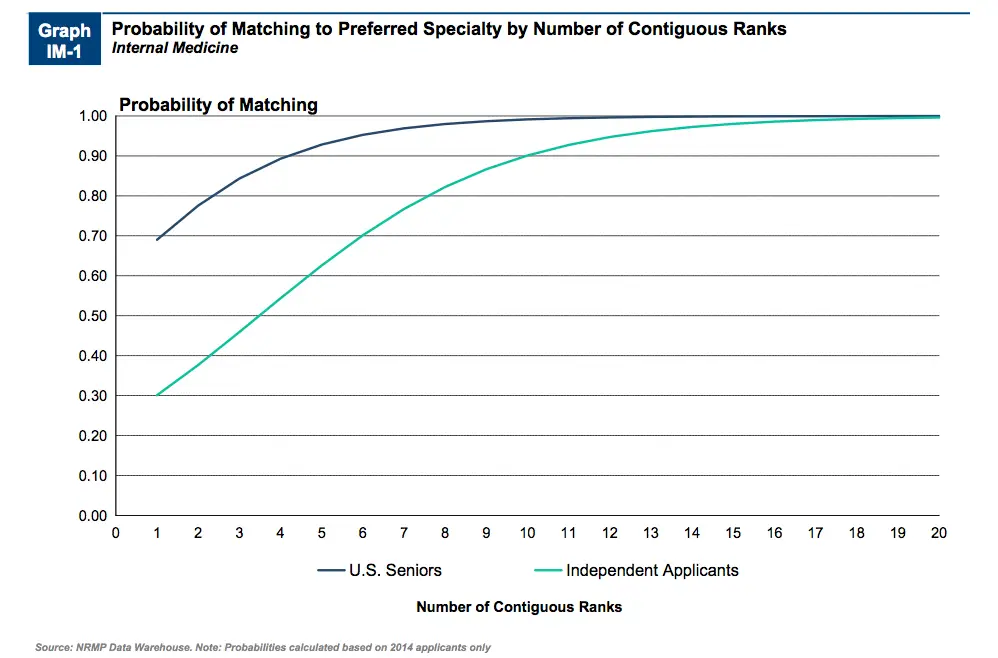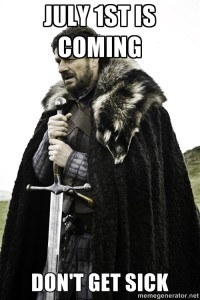Prior to starting intern year I interviewed Zack Manier about the residency application and interview process. Today he is six months into his intern year, the first year of his pediatrics residency at The Children’s Hospital at St. Peter’s University Hospital in New Brunswick, NJ. I sat down with Dr. Manier to find out what it’s like to be a freshly minted medical doctor.
Thanks for taking the time to let me interview you again. I introduced my readers to you a few months ago before we both started residency in an interview about the residency application and interview process. Fast-forward to today and we’re a little more than six months into intern year. What’s it like being a doctor?
Ummmmm…so many feels. Important, accomplished, nerve-wracking, busy, overwhelmed, stimulated, stressed, anxious, lost, rewarding, powerful, prolific…shall I go on?
That sounds like the all too familiar. So what’s the most rewarding part of being a pediatrician?
Honestly, the gratitude from the parents. Hearing parents (and even adolescent patients) compliment me or compliment me to an attending saying things like “best doctor we’ve had” (yes, that’s happened…I’m not just bragging) is so amazing. It makes all the times I feel completely stupid and useless worth it. Also, definitely having parents ask to specifically have me as their child’s doctor and come to my Thursday afternoon office hour. Clearly my competence (or confidence) is showing, and that is just as rewarding.
To contrast that story what has been the most frustrating part of residency?
Continuing to be at the bottom of the totem pole. “Yay, I’m a doctor now and no longer a student! I’ve moved up in the ranks!” Wrong. You’re back on the bottom. You’re just the intern. And yes, interns still do [female dog] work. Definitely not as much as when I was a student, but it happens. Oh, and overnight nursery pages. It’s frustrating, but hey…that’s the way the cookie crumbles, right? Now I want a cookie…
Ah, answering pages. Grey’s Anatomy made it always seem like every page was life and death. Turns out its more often that the patient is having too few or too many bowel movements. So what about residency do you find most challenging?
Trying to be confident with my decisions and not just looking to my senior for everything I’m unsure of (even though they are the best and are always happy to help). I’m not a student anymore. I’m not supposed to just ask my senior to do everything. I have to do it. It’s on me now. I make the phone calls. I order the medications. I call the attendings in the middle of the night. I tell the parents that Child Protective Services is taking their child away. I decide a baby’s respiratory status is improved enough to discontinue oxygen. And if that baby decompensates? It’s on me now. That’s something that you have to realize from day one…you’re a doctor now. This is the start of the rest of your career.
Our jobs can indeed be quite humbling and terrifying at times. Can you speak on what your biggest fear going into intern year was?
Probably what I just discussed above…that even though, yes, you have your seniors…you have to make your own decisions and become a self-sufficient physician. It was hard a first, but I quickly realized I didn’t have a choice. I couldn’t be passive (not that I am that type of person anyway). You have to. That made that fear dissolve within the first two months.
Also, one fear that I’m sure everyone shares…feeling incompetent. You’re going to enter feeling like you know nothing, especially when you’re put on the spot. I imagine that’s what tabula rasa feels like. But magically, somehow…from somewhere…the answers pop out. Your hand starts writing the corrects words. You’re entering medications like you’ve been doing this for years, and you start to realize you know more than you think. The knowledge is there…you just have to apply it.
Thankfully, my co-interns were/are all in the same boat. Having them around and spending time outside of the hospital with them to talk and vent (and drink) have helped to depress those fears.
Ah your co-interns. As corny as it sounds, I’ve found that they truly are the best part of any residency program. You spend so much time with them in the hospital that it’s nice to enjoy their company too. Speaking of hours, what are yours like? What’s a typical day for a pediatric intern?
This is obviously institution-dependent, but I guess I’ll give you a little snapshot into mine…
It all depends on the rotation. ER is just 18 shifts/month, and we basically make our own schedule— clutch. Lighter rotations like nursery and neurodevelopment as well as outpatient electives are typical M-F 8-5, with weekend floor calls here and there. Floor sucks. Floor sucks everywhere. Sign-out is at 6:30am, and intern sign-out to the oncoming evening intern is at 7:00pm. Yes, that’s 12+ hours a day, usually 6 days/week. Morning report every morning from 8-9am, noon conferences daily from 12-1pm, grand rounds from 9:30am-10:30am every Thursday, and my office hours (or continuity clinic) Thursday afternoons.
Oh, and nights…nights are great. We specifically do 3 sets of 2 weeks of nights as interns, which are 7pm-9am Sunday-Thursday. Which means weekends off (for the most part). Lovely.
My institution is (amazingly) different in a way…interns get every Friday night off. Every one. For the entire year. All eight of us. Those nights…we drink and complain. I also usually get at least one entire weekend off per month, and use that time to get the hell out of New Brunswick for sanity purposes.
Speaking of sanity, what do you do outside of the hospital to keep it?
I guess I covered a lot of that above. But yes…relax, drink, travel…in that order. I need it. We all do. Get close with your interns. Go out when you can. If not to drink then for dinner. Vent. Complain without your seniors around. Even if you think you’re in the most amazing place at the start (which I did), you will start to realize the flaws as you become familiar with the inner-workings and the politics. Every institution has them. And you need close people to talk about it with. That’s what we do. I can’t stress enough how important it is to be close with your co-interns, or as in my case, even your second (and sometimes third) years. Also, I get away when you can. I have friends and family all over, and getting out of the little hospital bubble with all your (likely) hospital friends is necessary to stay sane. Plus, I’m in the cold…I hate the cold. Winter sucks. I go to Miami every chance I get.
That’s great advice. How about exercising? How often do you find yourself exercising compared to before residency started?
This will be a short one. I don’t. I exercise the same amount as before, because I didn’t. Should I? Definitely. Quite honestly though, my feet hurt (I hate dress shoes). And after the day is over, I want to be horizontal. In my bed. Am I complaining? Yes. Do I plan to change this soon? Yes! You can’t be a doctor (especially a pediatrician) promoting health and wellness when you don’t do it yourself.
How often are you able to see your family or significant other?
This is something I struggle with daily. My family is in one city, my SO is in another, and I’m in a third. So when I get the chance, where do I go? To see my SO. It’s a hard decision, but I’m used to being away from my family…I went to college out of state, medical school internationally, and I haven’t lived at “home” in almost 10 years. It’s difficult being apart from my SO, and we need frequent visits to maintain our relationship, just like all long-distance relationships. Thankfully, we see each other at least monthly (whether I go there or he comes here), and Facetime is a live-saver. Since I moved to NJ in June, I haven’t been back home. My family did come visit for Thanksgiving, and I’m currently writing this on the plane home for Christmas. Holidays and occasions…that’s been pretty typical for seeing my family over the past years.
How are you handling the debt?
Debt? What’s that? Oh, right…I mean, the cronies automatically take money from my account monthly, and I don’t think about it. And that’s all I have to say about that.
When do you plan on taking step 3?
Bleh. Adult medicine. I don’t want to study it. It’s like, I want to take it and get it over with so I never have to study adult medicine again, but at the same time…I don’t want to start studying adults again. But alas, I must. I’m either taking it mid-February or end of April, as those are the times that work with my lighter rotations. I’m getting UWorld for Christmas (yay, adulting), so I’m about to start on that. Mainly, I don’t want to spend the $900 or whatever is it to take the exam. I’d rather spend it on drinks. Medicine is a damn money pit, ya know?
What’s it like having the responsibility of teaching medical students?
I love it. It’s great. I’ve tutored in the past and was a head anatomy TA in medical school, so it’s something I enjoy. It’s also nice to have attendings tell me that medical students compliment me and enjoy working with me. They don’t think I’m dumb! However, it is sometimes hard to give them full attention as the intern…especially on floor when it’s super busy and I have one million things to do. That’s what the seniors and attendings are for.
Also, pro-tip: get the medical students to follow your patients. That’s what I do. Why? Because on floor rounds, the student presents and gets pimped, not me.
In retrospect, with the knowledge that you have now, are there any questions you would recommend to medical students to ask during their interviews?
Other than all of the medical knowledge, you mean? I don’t think there is anything that I now wish I had asked…I pretty much knew what I was getting into, and I feel like it’s on par with my expectations. The most important thing is to ask the resident’s if they’re happy. We won’t lie. We really do tell it like it is. And definitely ask how they feel they attendings are and what their relationships are with the attendings. It will make a world of difference. I’m fortunate enough to have amazing attending physicians. It’s something I have been bragging about to all the interviewees this season. Like, you know how in medical school or residency even there are those physicians that people are “scared” to work with or grumble about being placed with? Yeah, we don’t have any. None. I would say 90-95% of ours are absolutely amazing, and the rest are good but ever-so-slightly more intimidating. That might be the best part of my residency. Definitely ask about that.
Speaking of medical students, do you strongly feel that there is anything you wish you did differently while you were in medical school that would have better prepared you for residency?
My one and only regret is not taking USMLE Step 3 prior to residency. I was going to, but I ended up drinking and traveling instead. (A common thread here, clearly) So, if you have time, seriously consider taking it. It will save you a load of stress and annoyance later, when that is the last thing you have on your mind or want to deal with. Otherwise, just be proactive. Act like a resident on rotations, not a student or a shadow. Ask to do procedures, to see extra patients, to write notes, to have your H&Ps checked and reflected on, to stay later, to make phone calls. These are all things you have to do as a resident, and the sooner you start, the better. These are all things I did, and not only did it get my outstanding grades and letters of recommendation, but it also significantly prepared me for residency. If you have all of these things (mostly) down before starting, you can focus on expanding your knowledge and being the best provider for your patients you can be.
For the current medical students reading this, what general advice do you have regarding residency?
First and foremost, the last line I just said. Be the best provider you can be FOR YOUR PATIENTS. That’s what it’s really about, and why (most) of us all are in this profession. It’s for the patients. Check your egos at the door. This isn’t about you, it’s about them. The rest…the knowledge, the fearlessness, the confidence, the competence…that will come with time. But your patients always come first, no matter what.

